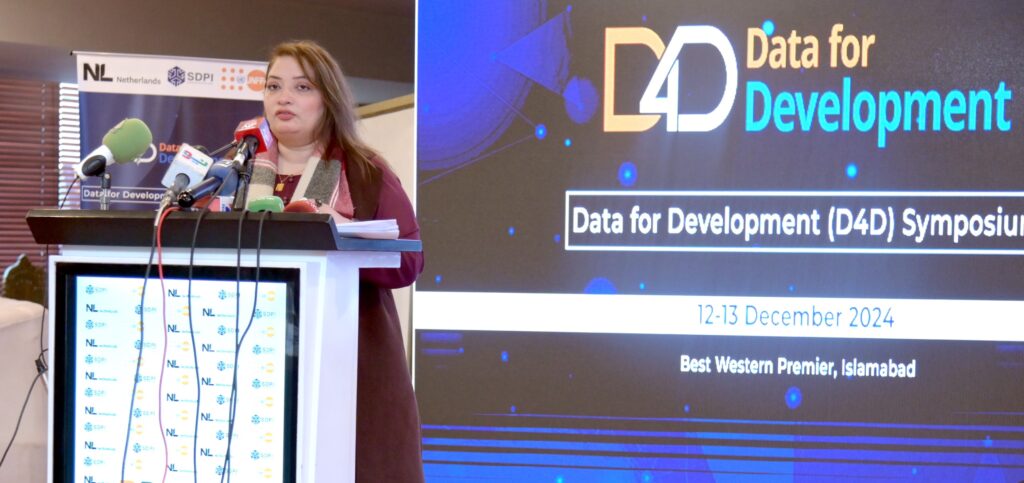
Credible, open-access data vital for transparency, socio-economic development, PM’s climate aide
Islamabad : Coordinator to Prime Minister on Climate Change, Romina Khurshid Alam, has said reliable and evidence-based data plays a crucial role in driving development across various sectors—be it economic, social, technological or environmental. Because, it fosters innovation by providing insights into trends, consumer behavior and market needs.
“The role of data in driving socio-economic development has become increasingly vital in many countries, particularly for developing countries like Pakistan, where gaps for credible data continue to block efforts for achieving various development goals and evidence-based policy and decision making,” the PM’s climate aide said in her keynote address to the concluding ceremony of the three-day capacity-building workshop ‘Data for Development’ organized here on Friday by UN Population Fund in collaboration with the Climate Change & Environmental Coordination Ministry, Sustainable Development Policy Institute and other development partner organisations.
Highlighting the unprecedented significance of the evidence-based and credible data, she told the participants from various governmental and non-governmental organisations at the event that as the country grapples with challenges such as poverty, inequality, unemployment, and climate change, data is the foundation for crafting policies, designing programmes and ensuring accountability in development efforts.
“We politicians and policymakers must understand the power of data for socio-economic development and that Properly collected, analysed and utilised data holds key to unlocking the potential for sustainable growth, social equity, poverty reducation, general development and equality, disaster resilience, environmental protection and improved quality of life for all citizens,” the PM’s climate aide Romina Khurshid Alam remarked.
Ms Alam said further that effective governance and policymaking requires evidence-based decisions. However, accurate, real-time data is critical as it can help policymakers in the country identify the most urgent needs in sectors such as education, health, agriculture, and infrastructure. For instance, by analysing poverty data and mapping regions with high poverty levels, the government can direct resources more efficiently to uplift marginalized communities. Data also helps track progress in various development goals, including poverty reduction, education, and healthcare improvements, she added.
Romina Khurshid Alam said that that for tackling growing environmental degradation, declining access to safe sanitation and drinking water as well as climate-resilience environments, real-time available data on environmental conditions, such as deforestation rates, water usage or carbon emissions, can be of unprecedented significance to efforts for achieving environmental sustainability and climate resilience.
Because, it helps inform policies that balance economic growth with environmental preservation. Accurate data helps track sustainability goals, such as those related to climate change, renewable energy, or conservation efforts, she added.
Data can also play a vital role in identifying the pockets and causes of poverty in Pakistan. By using poverty indices, household surveys, and income distribution data, the government and NGOs can better target poverty alleviation programs, ensuring that aid reaches those who need it most, she emphasized.
The PM’s climate aide added further the country’s healthcare sector faces significant challenges, such as limited access to quality healthcare services, especially in rural areas. Health data—such as disease prevalence, vaccination coverage, and healthcare facility distribution—can help allocate resources effectively and improve access to medical services. For example, data tracking the spread of diseases like polio or dengue allows for timely interventions to control outbreaks.
Romina Khurshid Alam said further that role of data in promoting transparaecy and accountability cannot be over-exaggerated. Data promotes transparency in both government and development projects, she highlighted.
“Open data initiatives in Pakistan can help citizens, civil society organizations, and the media hold the government accountable for its policies and spending. Access to data on public spending, infrastructure projects, and social programs ensures that resources are being used efficiently and that corruption is minimized. By making data publicly available, Pakistan can also attract international investors who value transparency and stability,” the PM’s climate aide remarked.
She said that Pakistan is home to a diverse groups of population, and targeted development interventions are critical to meet the specific socio-economic needs of different groups.
“Data on gender, ethnicity, disability, and rural-urban disparities can help design policies that promote inclusion. Data showing low female literacy rates or poor healthcare access in certain regions, for instane, can inform targeted programs aimed at improving conditions for women and girls,” the climate aide Romina Khurshid Alam remarked.
In an increasingly globalized, interconnected and data-driven world, the role of data in shaping Pakistan’s development trajectory is more critical than ever.
“The present government, in collaboration with international organisations and development partners, is already started making significant strides toward using data as a tool for promoting inclusive and sustainable growth,” she highlighted.
Romina Khurshid stressed, “There is pressing need for us all, particularly government officials, policymakers and politicians that data is not just about numbers; it is about people. By utilizing data effectively, we can ensure that the policies we design and implement reach the people who need them the most. Our commitment to data-driven development will enhance transparency, accountability, and efficiency across all sectors of society.”